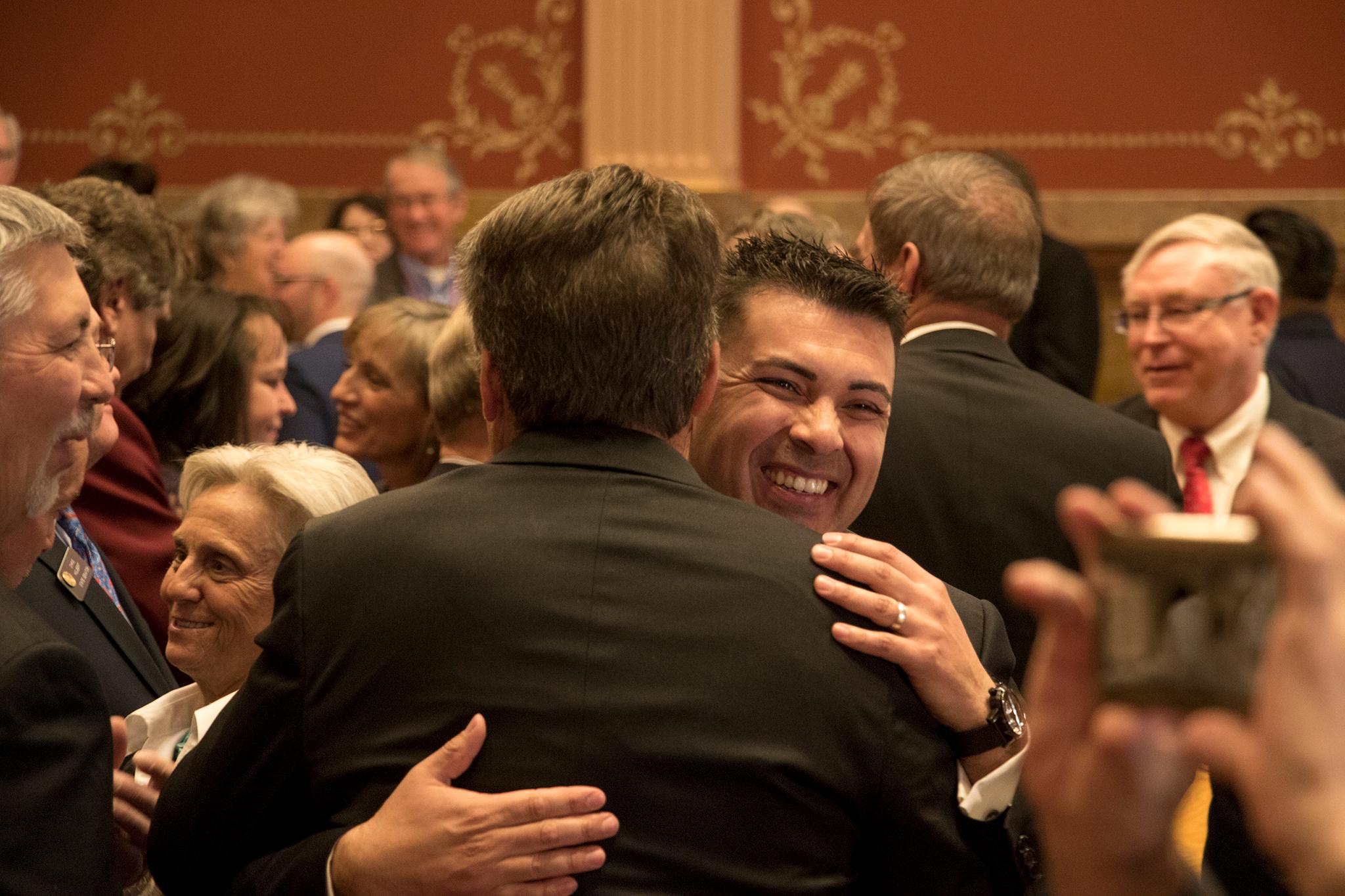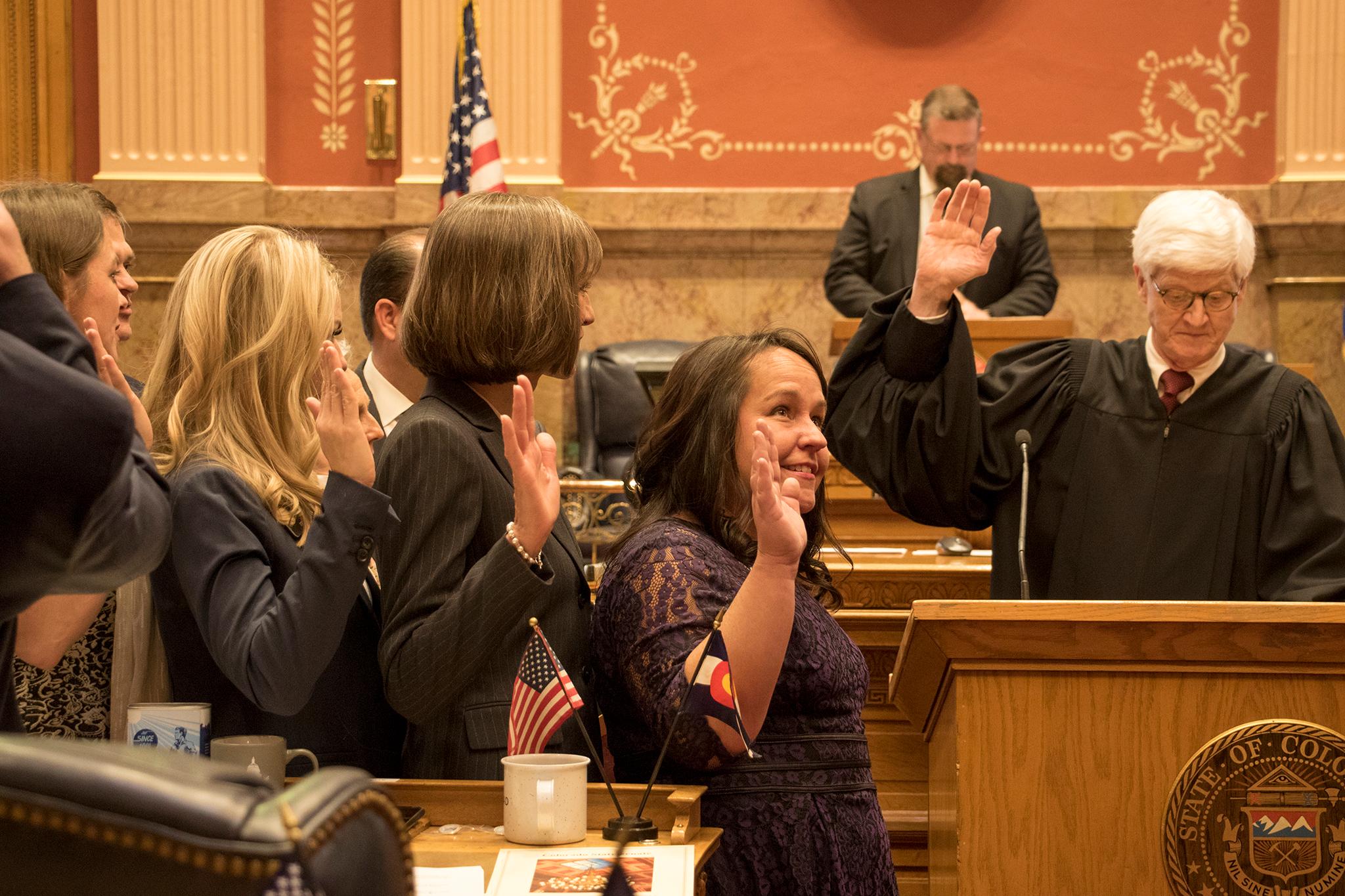Colorado's General Assembly convened Friday to begin this year's legislative session, and Democrats held their chins up slightly higher than their Republican colleagues as they began the session with majority control in both houses.
Both the Senate and the House held separate swearing-in ceremonies, followed by speeches outlining their objectives and goals for the upcoming legislative calendar.
The Senate chambers were filled with new faces after Democrats flipped the chamber last year, giving them a 19-16 advantage. Senate President Leroy Garcia of Pueblo will serve as the highest-ranking official in the upper house. Garcia is the first Latino President of the Senate.
This year's Senate is among the most diverse in state history, and Garcia was quick to note the historic nature of the Senate makeup.
"If you look around, you might notice that this body looks a little different than it has in the past," Garcia said, drawing some laughter in the chamber. "Not only do we have a majority of women in the Democratic caucus, but we also have one of the most demographically and geographically diverse caucuses in recent history."
Both Garcia and Minority Leader Chris Holbert got some time to deliver speeches. Garcia's remarks were short on details and instead painted a broader picture of what he hopes to accomplish for the state. Holbert provided some examples of bills and goals his colleagues are pushing for, including adding $336 million in funding for roads and bridges (and the same amount for K-12 education).
The lawmakers wasted little time. Before adjourning Friday, the first of many bills were introduced on the floor.
Here are three things we learned from the Senate opening day of the Colorado legislature (and if you're curious to learn about what's in store for the Democratic-controlled House, we've got something on that too).
Garcia doesn't want this senate to end up like the one in Washington.
Garcia's speech was brief, just about 10 minutes. Describing his own family's roots in the state, Garcia said when his family first settled in southern Colorado, they only spoke Spanish. But it didn't slow them down or discourage them.
That spirit of hard work along with the "spirit of collaboration" he learned from his service in the U.S. Marines are creating the kind of attitude he wants to bring to the Capitol.
"For too long, we have allowed political party to divide us," Garcia said. "Our state deserves better, our constituents expect more of us."
He added that finding common ground will take collaboration. He pointed out lawmakers weren't elected to "engage in gamesmanship," but to work.
Echoing concerns of House Democrats, Garcia said too many people aren't feeling the growth and prosperity in the state. He cited high healthcare costs, lack of equal pay, lack of access to K-12 education for kids and student loan debt.
Garcia mentioned the opioid epidemic and the need to provide programs for those affected by substance use. It was one of the few specific examples of proposed ideas; unsurprisingly, such a bill was among the first introduced Friday and sponsored by Garcia.
Striking a unifying note, Garcia said political differences can't come in the way of their shared goals for the state.
"Colorado is a special place," Garcia said. "I am absolutely confident that this body will be able to find many of the solutions to the challenges that we face."

Republicans are putting Democrats on notice over potential overreach (sorry, you're going to hear this word a lot).
Holbert called on Democrats to remember how voters decided on issues, instead of just candidates during the last election.
"Looking back to the elections of Colorado last November, it appears to me that the people of Colorado voted with you when it came to candidates and maybe more with me when it came to issues," Holbert said, referring to Garcia and alluding to voters rejecting tax increases.
Holbert talked about the changes made to the state's constitution, and the complex and curious mixture of principles it guarantees: It gives people the right to bear arms and the right to grow up to six marijuana plants.
It led to Holbert discussing how the Senate has often been labeled as the most contentious due to some of its rules and processes. He said all of this was done "because the people of Colorado wanted it that way."
Holbert said they have a unique opportunity to show effective leadership and honor the will of the people. That last part was perhaps his biggest point, with Holbert pointing to voter's rejection of a tax increase to fund transportation improvements and rejecting bigger well setbacks as examples of the will of constituents.
"Mr. President, you know better than any other current member of this body the risks of alienating constituents, of pushing too far," Holbert said. "Like me, you were witness to events of 2013 and you deserve credit, Mr. President, to the time and effort you have devoted to healing relationships and to restore trust in constituents."

There's a major difference already brewing.
Passing paid family leave is a big target for Democrats in both chambers.
Garcia briefly alluded to wages in general during his remarks when discussing the state's "booming business climate," suggesting he wants to ensure the state "grows good paying jobs but one that also values workers and pays them fairly."
Holbert offered a plea to colleagues to reject such a measure.
"Such is the case when we consider the expensive and seemingly inflexible requirement that employers provide paid family leave," Holbert said, adding that employers should be instead encouraged to add such an option. "We urge you, colleagues, don't require conditions that will ultimately lead to government forcing one company after another out of businesses, one job after another to longer exist."












